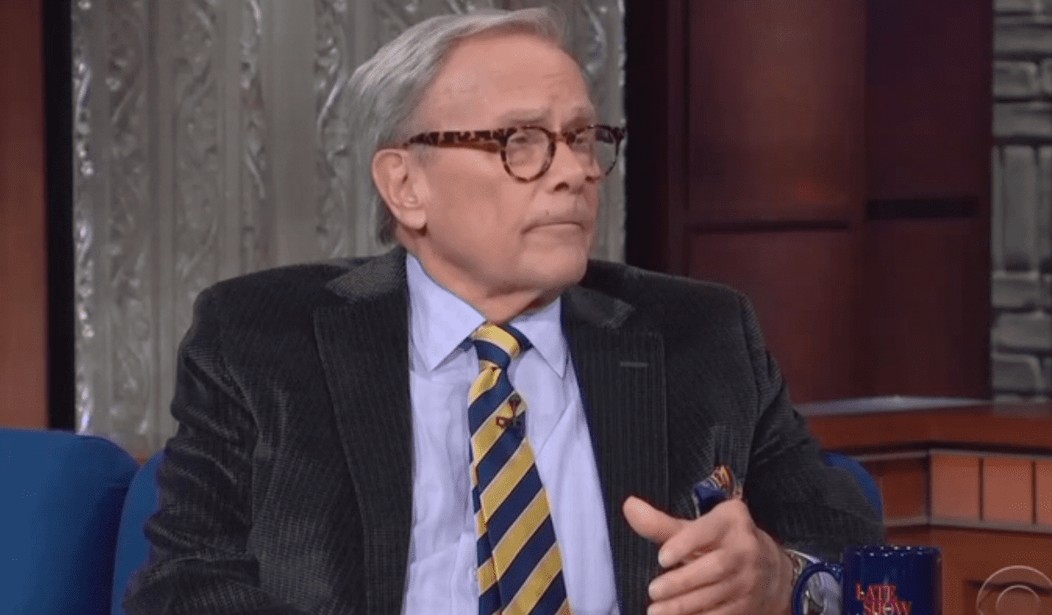You’ll always remember where you were the day VodkaPundit said, “Thank God for social media!” Don’t get me wrong. I’m not diving back into the Twitter cesspit ever, and I keep my Facebook interactions as polite and infrequent as possible. Yet here I am giving thanks to Big Tech’s most toxic innovation of all time.
Where it really gets weird is that I also have to thank an MSM-DNC anchor for setting me straight.
In a sitdown with Stephen Colbert on Monday night, NBC News fixture Tom Brokaw complained that people used to trust journalists before social media came along.
Brokaw went on quite the rant, shouting at clouds about a time that never really was. Read:
It was a big difference between now and social media. The fact is that this technological change — and I do believe that the people ought to have access to stating what they believe and what they want to be involved in, but we’ve lost control of it because you don’t know where it’s coming from, where it’s going, what the motivation is, and, so, when you see something, so many people believe it, ‘I believe that!’ and so much of it can’t be authenticated. That’s a huge difference between then and now. Doesn’t mean that those of us who are White House correspondents or in American journalism had all the answers but we worked hard at determining what in fact had happened, because we were liable for it at the end of the day, and the country paid attention to it, on that basis.
So much to unpack here.
(Hat tip to Newsbusters’ Kristine Marsh.)
Near as I can tell about Brokaw’s meandering statement, he’s actually complaining about two different things. The first is the sharing of “news,” real or imagined, on social media. Whether it’s a silly meme, a Babylon Bee satire, or outright disinformation, Americans love to share topical interest items on social media. Brokaw worries that makes us less informed somehow, but there’s really nothing new about sharing that kind of stuff.
When I got my first office job in the mid-’80s, I think the main thing people used the photocopier for was distributing primitive versions of what we now call memes. Guys — usually, but not always guys — would tape them to the wall or the sides of their desks, and sometimes fold one up and include it with regular correspondence with customers. It’s safe to assume this had been going on since photocopiers became commonplace in the 1960s, but even before then I’m sure the office mimeograph got put to lots of unofficial use.
About a year later, we got our first fax machine, and then things really took off, because what once took actual effort (and a 22¢ stamp) suddenly could be shared with about the same ease as running the photocopier. Email came along and exploded how we shared even further. Now it’s Facebook and Twitter, but the only important difference in sharing between now and the mimeograph era is the increase in speed and scale. But then, as now, people believed what they wanted to and laughed at the rest.
Brokaw, nearly 80 years old and with a long history of office work (in the communications field!), ought to know all this.
The second part of Brokaw’s complaint isn’t about what people believe, but about whom they trust. Or rather, no longer trust. And here’s where social media deserves your applause.
People trusted Tom Brokaw. They trusted Walter Cronkite. They even trusted Dan Rather. But that’s because we didn’t really know Brokaw or Cronkite or Rather, et al. I’m not saying they didn’t work hard as journalists (although perhaps Rather was an exception), but what I am saying is that they worked very hard to play hardworking journalists on TV. Sitting at a TV anchor desk is in a way no different from an actor playing any other role.
I did something like it for years at PJTV, and still do at BillWhittle.com. So let me tell you from experience that when the camera light goes on, it doesn’t matter how crabby you might be that day, how sick you are, or how little sleep you got the night before: You put on your anchor face and voice, and make yourself look and sound like the pro they’re paying you to be. It isn’t just TV news, either. A reporter has a certain “voice” to maintain no matter what, and if the performance isn’t quite as complicated as it is in front of a TV camera, it’s still a performance.
Social media, particularly Twitter, where journalists tend to congregate in real-time, pierces that performer’s veil. If Americans don’t trust journalists the way we (maybe) once did, it’s because — and this is a very important point, so please pay attention — we know them better.
In other words, Brokaw isn’t worried that we know too little, or that what we think we know just isn’t so. He’s worried that we know too much. Our ignorance was the media’s bliss, but those days are over… thanks to social media.










